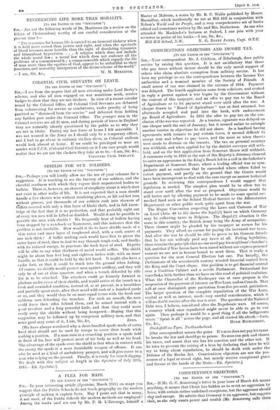SHIELDS FOR OUR SOLDIERS.
[To THE EDITOR OF THE " SPECTATOR.")
SI11,—Perhaps you will kindly allow me the use of your columns for a suggestion. It is touching to see the bravery of our soldiers, and the cheerful readiness with which they expose their unprotected bodies to bullets. There is, however, an element of simplicity about it which does not exist in other walks of life. It is not expected that a man should handle a live electric wire without insulating gloves, or lift red-hot iron without pincers, yet thousands of our soldiers rush into showers of bullets covered with only a thin layer of khaki cloth, and in full know- ledge of the fact that it is no protection, and that probably eight out of every ten men will be killed or disabled. Would it not be possible to provide the men with shields ? We frequently hear of bullets having been stopped by a notebook or Testament, and this indicates that the problem is not insoluble. How would it do to have shields made of a thin outer and inner layer of toughened steel, with a cork centre of one inch thick ? A bullet striking such would have first to pierce the outer layer of steel, then to find its way through tough cork, and finally, with its reduced energy, to penetrate the back layer of steel. Experts will be able to say what thickness of metal would suffice. The shield might be about four feet long and eighteen inches wide, with an inner handle, PO that it could be held by the left hand. It might also have a spike foot, so that it could be stuck into the ground when halting. Of course, no shields would protect men against artillery, and they will only be of use at close quarters, and when a trench defended by rifle Ere is to be attacked. The attackers could go leisurely forward in phalanx under cover of their shields, and would arrive at the trench in a fresh and unwinded condition, instead of, as at present, in a breathless and partially spent state, after their usual wild rush of a hundred yards or so, and they would thus be on more equal terms with the fresh and unblown inen defending the trenches. For such an assault, the men could leave their rifles behind them, and be armed instead with a good revolver and a long powerful knife, and thus they could more easily carry the shields without being hampered.—Hoping that this suggestion may be followed up by competent military men, and that
[We have always wondered why a short-handled spade made of extra hard steel should not be used by troops to cover their heads while rushing a position. If a man runs in a crouching position a spade held in front of his face will protect most of his body as well as his head. The advantage of the spade over the shield is that when in contact with the enemy the spade is a most formidable weapon of offence. It can also be used as a kind of ambulatory parapet, and will give cover to a man who is lying on the ground. Finally, it is ready for trench digging. We dealt with this subject at length in the Spectator of July 24th, 1915.—Ed. Spcclator.].


































 Previous page
Previous page